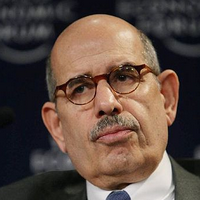Since his return to Egypt and dramatic entry into the Egyptian political spotlight, Mohamed ElBaradei has attracted support from various political blocs, as well as from the Egyptian people, who tout the former head of the International Atomic Energy Agency as a hero. However, the enthusiasm with which many Egyptians, especially the young and marginalized, have joined his campaign is based largely on frustration and a desire for social and political change, rather than actual support for ElBaradei himself.
Indeed, ElBaradei's strategy so far has resembled an effort to be all things to all people, in order to satisfy the extremes of the Egyptian political spectrum. His unlikely coalition, gathered under the umbrella of the National Association for Change, includes both leftist parties and the Muslim Brotherhood. He has held these disparate elements together in part by refusing to articulate a policy agenda, thereby preventing any attempt to determine his true political colors.
ElBaradei is due to visit London on June 11 to present his campaign to the Egyptian diaspora. While many inside Egypt may be satisfied by any hint of hope, those abroad will prove to be a harder sell. To win their support and trust, and to present himself as a serious political figure with a defined and sustainable vision, ElBaradei needs to clarify his vision based on the following key questions.

